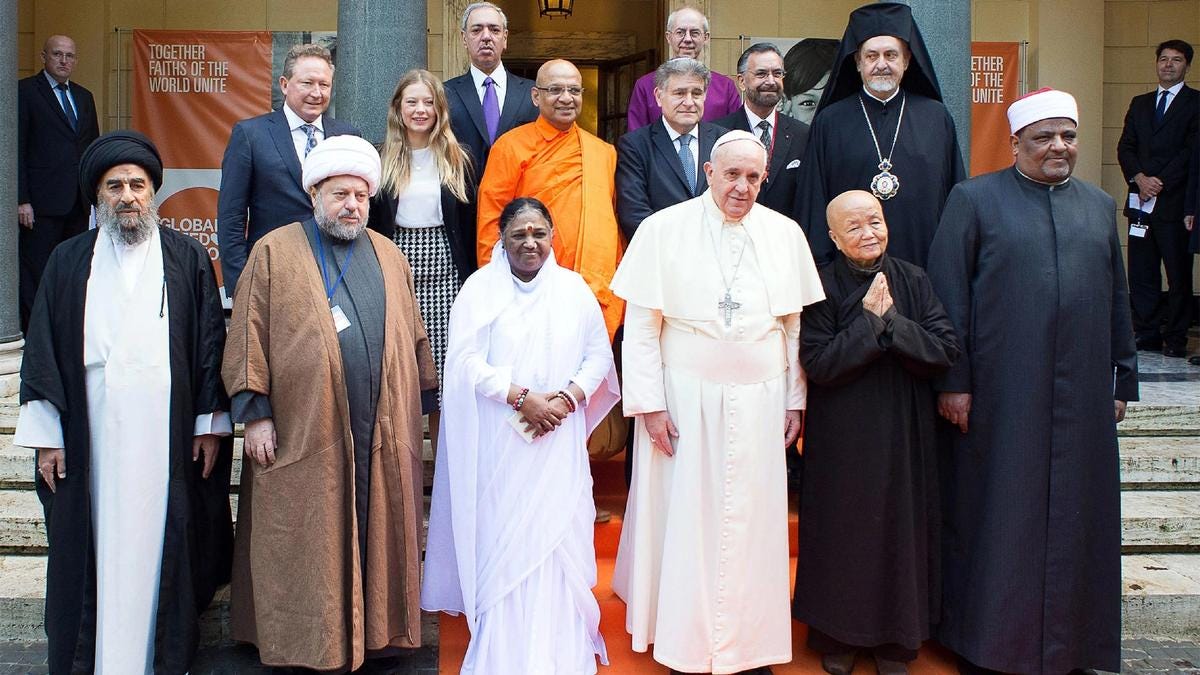Guest Post: Faith Leaders Respond to Our Climate Crisis
From The Green Dispatch's Paul Hormick. Welcome, Paul!
A few weeks ago Paul reached out and suggested that we write guest posts for one another’s newsletters. What a great idea! I have unlocked this post, including the ability to post comments, for all of my subscribers. We would love to hear your thoughts and responses to Paul’s writing. And check him out at
!Hey! I’m Jessica, and welcome to my newsletter about faith and climate action. We are in a climate emergency; it’s all hands on deck...
In honour of Paul’s guest post, for THIS WEEK ONLY you can receive a 10% discount off a one-year subscription! Upgrade today!
Want to support my work but not ready or able to subscribe yet? You can buy me a coffee! Click here:

Faith Leaders Respond to Our Climate Crisis
First of all, I’d like to thank Reverend Hetherington for allowing me to cross-post from my Substack, The Green Dispatch. I’ve admired Reverend Hetherington’s Faith. Climate Crisis. Action. for quite some time, and I’m honored to have this opportunity.
We’ve known for over 100 years that human-caused CO2 emissions warm our world. Scientists have measured this increasing CO2 since the 1950s. And as glaciers melt and seas rise, many people throughout the world are plagued with drought, heat waves, and wildfires. We know that climate change is here and we know that unless we do something about it, the health and lives of millions may be jeopardized and ecosystems will be more stressed, with the possibility that hundreds, perhaps thousands, of species facing extinction.
We need to curtail our greenhouse gas emissions and ready ourselves for the consequences of climate change. But unless we fully face this condition we have made for our planet, and ourselves little will be done. If we don’t believe climate change is happening, nothing at all will get done. That’s why I was chagrined to learn from a recent poll that the more active an individual is with his or her place of worship, the less likely that person will believe the science of climate change or think of it as an important problem. And the folks most concerned about our warming planet are atheists!
Growing up in the United States, I saw faith leaders inspiring others and giving moral clarity to important issues. The Reverend Martin Luther King Jr. led the civil rights movement with a message of love and brotherhood. The very first protests of the Vietnam War were instigated by the Berrigan brothers, both Catholic priests. Despite the doubts of their congregants, many faith leaders and religious organizations are following in the footsteps of Dr. King and the brothers Berrigan. This time the crisis is climate change.
Perhaps in anticipation of inspiring his Church to care for the environment, upon assuming the papacy, Cardinal Bergoglio took the name of Francis, the Catholic saint remembered for his love of nature. In 2015 the pontiff published his encyclical Laudato Si: Care For Our Common Home. In its 184 pages, Francis took aim at consumerism and addressed global warming and our environmental crisis in general.
In 2021, Francis followed up Laudato Si with a seven-year action plan for the Church. Focusing on seven areas of the Church—families, parishes, religious orders, schools, hospitals, organizations, and businesses—the plan hopes to achieve seven goals: responding to the cry of the earth, responding to the cry of the poor, ecological economics, living simply, ecological education, ecological spirituality, and community involvement. The pope issued another encyclical, Laudate Deum last year, which recognized the growing seriousness of the climate crisis.
In a statement made in 2016, the World Council of Churches, the largest ecumenical organization in the world, emphasized to their member churches and governments throughout the world to look beyond their national interests and care for climate as a way to safeguard and promote human rights.
In early 2006, despite opposition from their fellow church leaders, prominent evangelical Protestants backed a major initiative to combat climate change, saying, “Millions of people could die in this century because of climate change, most of them our poorest global neighbors.” Citing the biblical injunction to “care for creation, love our neighbors and witness to the world,” the National Association of Evangelicals issued a major report in 2022 urging their believers to undertake climate activism.
Canada’s largest Protestant denomination, the United Church of Canada, is taking direct action on global heating, setting the goal of reducing its carbon footprint by 80 percent by midcentury. The church is also divesting its investments from large fossil fuel companies.
According to a recent Pew Research poll of all the religious denominations in the United States, Jews were the most likely to be concerned about climate change. Like their Christian siblings, however, the more conservative the Jewish practitioner, the less involved he or she may be in solving the climate crisis. Conservative Jews are less involved than Reform, with Orthodox practitioners the least involved. In response to climate change and deepening environmental strains, the leadership of many North American Jewish organizations, along with prominent rabbis, created the Coalition on the Environment and Jewish Life in 1993 to create a Jewish response to environmental strains and climate change.
In 2015, Muslim leaders issued the Islamic Declaration on Climate Change, calling upon all people and all nations, not just Muslims, to phase out greenhouse gas emissions. A prominent religious leader to actually pen a book on climate change is the Dalai Lama. In Our Only Home, which he co-authored with theologian Franz Alt, the Buddhist spiritual leader advocates for leading a simple life and adopting a vegetarian diet.
How about you? Does your place of worship have a climate plan? Does your faith inspire you to undertake climate action? Please let us know in the comments section.
Thanks, Paul! If you haven’t already, go to
and subscribe now. My guest post will be up there on Friday.And if you haven’t already, take advantage of this week’s collaboration offer and get 10% off a yearly subscription to
:





